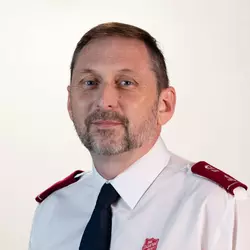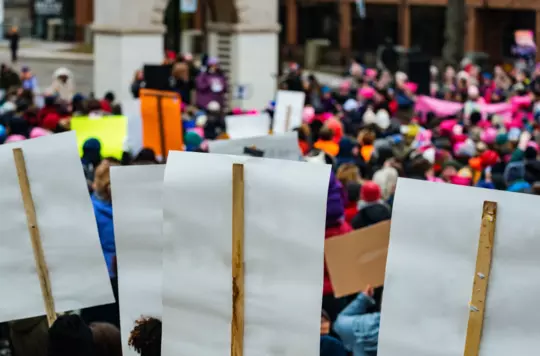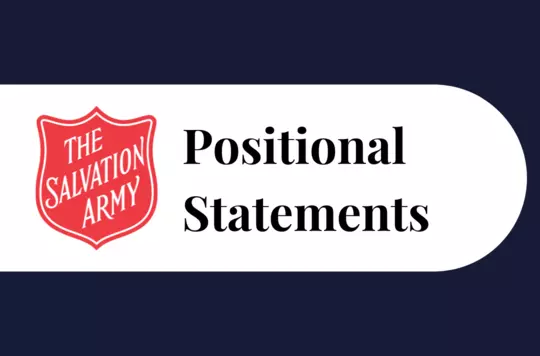23 June 2023
Prayer, politics and the Illegal Migration Bill
Major Nick Coke
Ahead of an ecumenical call to prayer in response to the Illegal Migration Bill, Major Nick Coke reminds us that we are called to engage with the world.
‘The Church should stay out of politics.’ ‘Politics should stay out of the Church.’ ‘Religion and politics don’t mix.’ ‘The Salvation Army is apolitical.’ ‘Jesus had nothing to do with politics, so neither should we.’
These are just some of the statements that I hear on a regular basis from people inside and outside the Church, including Salvationists. I understand what usually lies behind such perspectives. Historically speaking, when the Church has fused itself with party politics, whether on the left or the right, there has been compromise and capitulation, which is why The Salvation Army is strictly non-partisan.
While I agree there are dangers lurking in the mix of religion and politics – and it may be nice and comfortable to dislocate ourselves from the messiness of modern-day politics – there is nothing in the Bible, our theology or our tradition that allows us to opt out altogether. Christians are called by God into the world as it is, with all its sin, injustice, inequality, brokenness and oppression. Since politics are society’s way of engaging with many of those things, we need to engage, not withdraw.
The modern, western worldview that divides sacred from secular still looms large over our imaginations. Four-hundred years of Enlightenment thinking has done a good job influencing even the religious to believe that faith is a personal matter and primarily belongs in the private sphere. But for most of the Church’s existence, and certainly in the understanding of Jesus and his very first followers, this thinking is completely alien. In both the Old and New Testaments, there is the clear assumption that, since all of creation belongs to God, there is nothing that can be separated from God’s sovereignty: ‘The Earth is the Lord’s, and everything in it, the world, and all who live in it’ (Psalm 24:1).
God is over all things – including personal faith, communal religion and societal politics. While faith may have a personal dimension, it’s certainly never private. In Salvationist thinking, there is the understanding that there is an inseparable connection between personal salvation and active service in the world. Prayer and worship naturally spill over into public life. A life of holiness is not lived away from the world but in the very places Christ’s love is needed most.
When the Pharisees asked Jesus the politically charged question of whether people should pay taxes to Rome, it was a question about the very idea of how far politics should stray into religious life. Jesus answered: ‘Give back to Caesar what is Caesar’s, and to God what is God’s’ (Matthew 22:21). It wasn’t an endorsement of a sacred-secular divide, but a challenge back to the questioners about how far they thought God’s authority extended. Did they believe that their money belonged to God or to Caesar? There was only one conclusion they could come to: everything, even money, even the highest earthly power, was subject to God’s authority.
With all this in mind, then, I want to underline the importance of the territory’s call to prayer on 12 July for the Illegal Migration Bill that is currently passing through the UK parliament. As politically divisive as this bill is, it demands that Christians do not shrink back from it but come to it with prayerful action.
At the heart of this proposed legislation are vulnerable people, including victims of modern slavery, who have been trafficked across the English Channel. At present, all victims of modern slavery are entitled to specialist support and assistance in helping them recover. This bill, however, will remove that right for thousands who have found themselves being tricked, traded and trapped through no-fault of their own. If ever there were a moment for the territory to join together in earnest prayer and speak clearly about the priorities of the most vulnerable, it is now.
This call to prayer is also a reminder of something else significant about prayer itself.
In the very act of prayer, we adopt a political posture. When we address our prayers humbly to a sovereign God, we acknowledge where true power lies – not with the state, or with money, or with influential people or institutions, but with the Lord of all things. As we bring the longings of our hearts before God, we often speak words about an alternative world, where God’s justice, peace, truth and love reign. This process, in its own way, calls for a reordering of how the norms of our society often work. Prayer, then, turns followers of Jesus into activists who want to see the world as it is turned upside down.
Let us allow our prayers to enlarge our vision of the Kingdom of God. As we cry out to him, both for victims of modern slavery and for political leaders, may our prayers speak of a world, a Church and a political system that is subject to the just and righteous authority of God.
Written by

Major Nick Coke
Territorial Co-ordinator for Justice and Reconciliation, THQ
Discover more

Captain Marion Rouffet highlights the biblical basis for the Army’s response to modern slavery.

Major Nick Coke considers how to seek justice in a society longing for reconciliation.

Major Mal Davies considers why it is important to pray for leaders wherever you live.

The Salvation Army's International Positional Statement on Modern Slavery and Human Trafficking.
